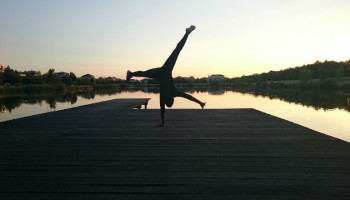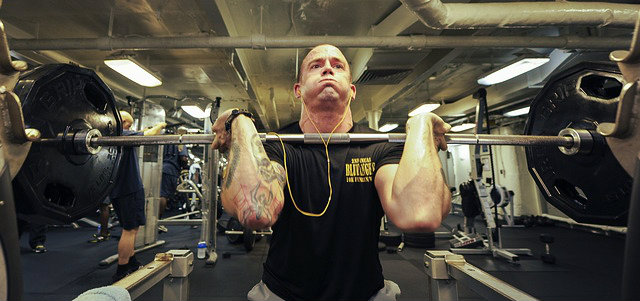 Reading Time: 8 minutes
Reading Time: 8 minutesIn terms of a journey, there is no greater process than the pursuit of our wellness. The Buddha knew this, and he made it his life’s mission to ensure as many people heard this profound simplicity as possible. But for many people, the journey stalls as a result of needing to get from point A to point B as quickly as possible. We want a bigger deadlift, a bigger bench, and six-pack abs all in a matter of weeks.
The great therapist Clifton Mitchell taught me we should not sacrifice direction for speed. One of the places I find direction is in the Four Noble Truths of Buddhism. The first noble truth states there is suffering, and the second noble truth lets us in on the cause of that suffering. But we will not be focusing on either of those here. We are going to take action, so we are examining the third noble truth.
The third noble truth provides us with a cure for our suffering: practice. You may at first glance think, “I am not suffering.” But what is it we are all doing when we jump on quick-fixes and diet plans? Are we not trying to solve something that brings us pain and discomfort? So what can “practice” do when it comes to solving this problem for us? The act of daily practice is the perfect starting point for the person who feels stalled, frustrated, or without a course of action.
Practice Makes Practice
The third noble truth takes us closer to the realization of our true strength, and where we potentially find hope and relief. It provides us with the knowledge that the relief of our discomfort is rooted in practice—not in achieving a particular outcome. Daily practice, therefore, gives us a form of influence over our life that we may not have previously realized.
In Buddhism, the majority of our “practice” is done through meditation. But practice is not relegated to this one concept. Practice can be anything that allows us to focus on the exact moment without becoming attached to a big payoff. For those of us who spend time in the gym, our training provides an already existing platform for “practice.”
Our strength training sessions serve as a daily opportunity to listen to our body, expand previous limitations, and realize that what we were previously attached to—a score, a weight, or a number—was simply a small step along our path. If setting one personal record was all we ever wanted, then why do we keep coming back?
In strength training, many of us are aware of the need to simply put in the work. We know that every workout brings us one step closer to our goal, and that every well executed rep gets us one step closer to seamless technique. We become machine like and technical in ways that feed our ability to form a sense of self. It is in this truth where we discover that through diligent practice we can be removed from our attachment and suffering. The ups and downs of training impact us less because we prioritize quality training time over a need to achieve new records every day.
It is in the third noble truth that we are let in on the “cure” for our particular suffering and attachment. This cure is rooted in our ability to put in daily, intentional, attentive effort toward reducing attachment. You know you are not your deadlift, right? Nor your back squat? Being able to reduce your attachment to outcomes is an exceptionally relevant skill when you have great teachers like barbells, stones, axles, sandbags, and our greatest teacher—gravity.
Zen master Dogen, and many other teachers, taught that nature is always revealing the truth to us. They frequently taught that the sound of the river or the blowing breeze contains all the information we ever need to know about the true nature and reality of all things. These are concepts that go beyond anything words could teach us. The tools of the strength training trade take the place of nature in this dialogue. There is no greater teacher than weight. The barbell will always carry with it all the lessons we need to know. It is chanting all the mantras that have ever existed by just sitting there waiting to teach us.
As a strength athlete, you have thousands of opportunities per training cycle to learn the lesson of mindful attention. In meditation, there are activities such as following the breath, focusing on a flame, or reciting a mantra. All of these are important in learning a foundational practice, but none of them can bring about the intense focus that is present when you need to pull one and a half times your bodyweight off the floor. You can choose to start that rep thinking about the next one, or you can let each and every rep drown out all the chatter and noise. In that moment, you have a learning opportunity few will ever discover.
Love Your Fear and Love the Grind
The effort involved in daily, intentional practice seems tedious and unnecessary. This tedium creates hesitancy and fear related to the investment of your time. In a world where we are told that weight loss can happen overnight, the part of us that understands the incremental nature of change has been lost. We become afraid that our long-term effort will be criticized by the metaphorical hare passing up our tortoise. In response to this fear, I offer two pieces of advice:
- Fear is a wonderful thing. It is a great consultant, and normally a poor leader. Fear should get its opportunity to speak and be heard without getting the chance to drive all of the decisions in any specific process.
- Be wary of sudden and extreme change. If you are reading this to find the path of least resistance it is time for us to part ways. In my practice as a psychotherapist I am very wary of the person looking for speed in therapy. Change is not known for its speed, but trust me, if you resist change, then your suffering will increase.
If you are able to embrace the process of change and tedium of learning, then you understand the nature of reducing suffering. We are here to learn the process of goal development and self-acceptance. We are not here to double our bench press or get a six-pack in four weeks. I have seen the kinds of decisions a person has to make to get that kind of gain, and those decisions are still illegal in this country.
To make the decision that you must meet goals quickly and without patience is to make the decision that attachment and suffering will remain your training partner. Speeding up strength-related goals can lead to injury, and you are likely to attempt to speed up recovery to return to your previous numbers. These two patterns will continue until you develop enough self-compassion and patience to slow down and listen to what your body needs.
In the four noble truths, we look to relieve our suffering through our willingness to see the error in absolute “truth.” In our daily lives, we become too attached to ideas that hinder our development. Imagine you set a goal of bench pressing 500lbs, but you also decided that every workout should end with a 500lb attempt. Even if you were doing everything else right, you would still end up overwhelmed and hurt. The reason for this is not the weight. The problem is your attachment to the idea that you have to be ready for 500lbs right now.
With this mindset, every attempt at the max becomes a veiled self-attack. Rather than appreciating yourself as a person pursuing excellence, you are sitting down once a day and sending the message to yourself that all your other hard work is useless because you are still not good enough. Even though this is an extreme example, it is no different than the times we have given up on programming too early, overtrained, or even quit for a time because we were so upset that we were not progressing
In Zen Buddhism, we do not meditate to pursue enlightenment. We meditate to meditate. As many great teachers have said, “Sit down, shut up, and listen.” In our strength training, we have the opportunity to make practice the goal. Sit down with your current goals, and ask this question, “Do my goals lend themselves to a daily practice true to my integrity and values or do my goals reflect my impatience and attachment to something I imagine will make me feel like a concrete version of myself?”
Ask yourself, “Am I looking for external approval or contributing to my ability to feel I can be myself in all instances?” If a goal causes us to feel that we need approval or attention it is likely we are getting caught in a bottomless cycle. But if we have a goal that allows us to feel like we are truly reflecting our priorities as an athlete, e.g. feeling healthy or strong, then we are creating a practice that feeds our daily growth.
The third noble truth helps us see that the answer is in the practice. We become engrossed in the acceptance of effort. We see that consistent, compassionate, daily practice is our path to strength, acceptance, and wellness. The third noble truth removes expectation and replaces it with practice. This is the greatest lesson we can learn as a strength athlete.
Practice Is the Key to a Limitless Life
Attaching to the idea that we can create an unwavering concrete version of ourselves is the root of suffering and eventually will stifle our practice. Without our daily engagement in life we will become stale and slow to change. We must seize the chance to stop making ephemeral goals, and start making our practice the one constant companion on our journey. We will always limit ourselves by creating a concrete goal. The only goal is practice. We cannot afford to idolize a concrete idea as if that idea will somehow finally fulfill us. This will always limit possibility. This creates a version of ourselves that needs credit, heroic praise and attention. These things limit the strength of simply putting in the reps, staying present, and allowing our sentient nature to arise from the internal strength that is ever present within us.
To become attached creates suffering, but our practice allows us to see that our limitless self does not set goals. Our limitless self is beyond goals. We have achieved a limitless nature. We must allow our practice to show us this truth every day.








